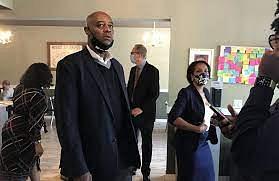On Campaign Trail, Ray McGuire Says Business Community Is Critical To NYC's Comeback
Entering a cafe on Staten Island last week, mayoral candidate and former Wall Street executive Ray McGuire scanned the room as he was ushered in for a meet-and-greet with local merchants. It was one of several stops on a tour of the borough’s business community as his campaign struggled to gain traction.
The group of business owners, predominantly women of color, had many grievances, from a lack of loans from the Paycheck Protection Program to transportation challenges on the island. McGuire remained mostly silent, listening.
He was mellow until it was his turn to speak, at which point he tossed out rapid-fire questions about staff sizes, broadband access, and funding streams. He seemed in his element as a former investment banker. The difference, though, is McGuire was at the top of the corporate ladder at Citigroup and now, among the eight leading Democratic mayoral candidates, he’s near the bottom rung.
In an interview with Gothamist/WNYC, McGuire, 64, said running for mayor was not a vanity project, and argued that his record of managing billion-dollar budgets sets him apart from the rest of his rivals.
“Let's take a look at those people who've been in government all their lives. Where's the government now?” McGuire said. "We're going backwards in education. We've gone backwards in the economy, backwards in healthcare. And we've gone backwards on criminal justice.”
He certainly has some of the New York business community behind him. His 13 years working as vice chairman at Citigroup—where he facilitated the $80 billion sale of AT&T to Time Warner—earned him the respect of his peers.
To many of his former colleagues, McGuire is best suited to run the city and get it out of its financial hole. According to the NY Times, several characterized McGuire as an “approachable leader and willing mentor,” but also an “image-conscious manager who could struggle with indecision."
His campaign is focused now on introducing him to more New Yorkers with an advertising blitz. Despite spending $8.2 million of its $11.7 million campaign war chest, more than any other candidate, McGuire is not widely known. He’s raised money privately, foregoing the city Campaign Finance Board’s matching funds program. His campaign has also received millions of dollars in super PAC money, for which he emphasized there’s no coordination, per state rules.
McGuire, a generous donor to local arts and non-profit groups such as the New York Public Library, Council of Urban Professionals, Harlem School of the Arts, and the New York City Police Foundation Board, said the business community had an important role to play in helping disadvantaged New Yorkers and the city as a whole recover from the COVID-19 pandemic.
“Remember in the '70s, business, government, and labor all came together in order for this city to survive,” McGuire said. “The narrative that is now part of the discourse is a narrative of divisiveness. It's not a narrative of where we bring people in. We cannot, the city cannot, survive and have a future as long as we remain divided.”




